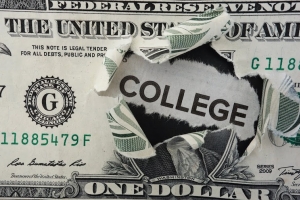Should NH act to reduce student loans?

Many Presidential candidates have presented plans to reduce student loan debt. Their proposals range from privatizing student loan programs, to letting students refinance at lower rates, to providing federal grants for free tuition at community colleges.
State governments are also considering whether student loan debt is a problem they need to address.
According to a new brief from the National Conference of State Legislatures, here are some of the policies New Hampshire could consider to reduce student debt:
Increase state funding for public colleges and universities
New Hampshire is last in the nation for per capita funding of higher education. For the past several years, the University System of New Hampshire has offered to freeze or decrease tuition if the legislature increases funding. Lower tuition might help students take out fewer loans. On the other hand, a tuition decrease at public colleges would have no impact on the debt of students at private colleges.
Give students more information before they take on loans
After giving more individualized information to students about their student loans – including an estimate of monthly payments down the road – the University of Indiana saw an 11% decrease in the use of student loans. Providing information to students about their loans may be a low-cost way to decrease over-borrowing. On the other hand, that information might deter some students who would otherwise complete college and secure a job with ample salary to pay back loans.
Allow tax deductions
Maine, Massachusetts, and Rhode Island all offer a state tax credit for student loan payments. Given New Hampshire’s limited tax revenue compared to other states, a tax credit proposal would face an uphill battle in the state legislature, however.
Offer alternative student loans
Massachusetts is one of a handful of states to offer low-interest and/or no-interest student loans. These loans could decrease the amount of interest students accumulate over time. However, low-interest loans do not address the underlying problems of high tuition costs or over-borrowing.
Repay loans in return for work
According to the National Conference of State Legislatures, 35 states have some type of program to repay a student’s loans if the student stays in-state and works in specific fields, such as health care. These programs may benefit states by decreasing the out-migration of young people. However, loan repayment programs do not address the underlying problems of high tuition costs or over-borrowing.
Expand Child Savings Accounts
In 2015 Gov. Maggie Hassan (D) signed HB 577, which establishes a pilot Child Savings Account program in New Hampshire. The pilot program will establish savings accounts with a $50.00 balance for kindergarten students in Coos County and the city of Manchester. A commission is tasked with fundraising for the program. Child Savings Account programs are intended to increase the amount families save for college. However, the programs will not impact college age students and adults who already have significant debt.
Do you think New Hampshire should attempt to decrease student debt? If so, how? Comment below!











Comments
Login or register to post comments